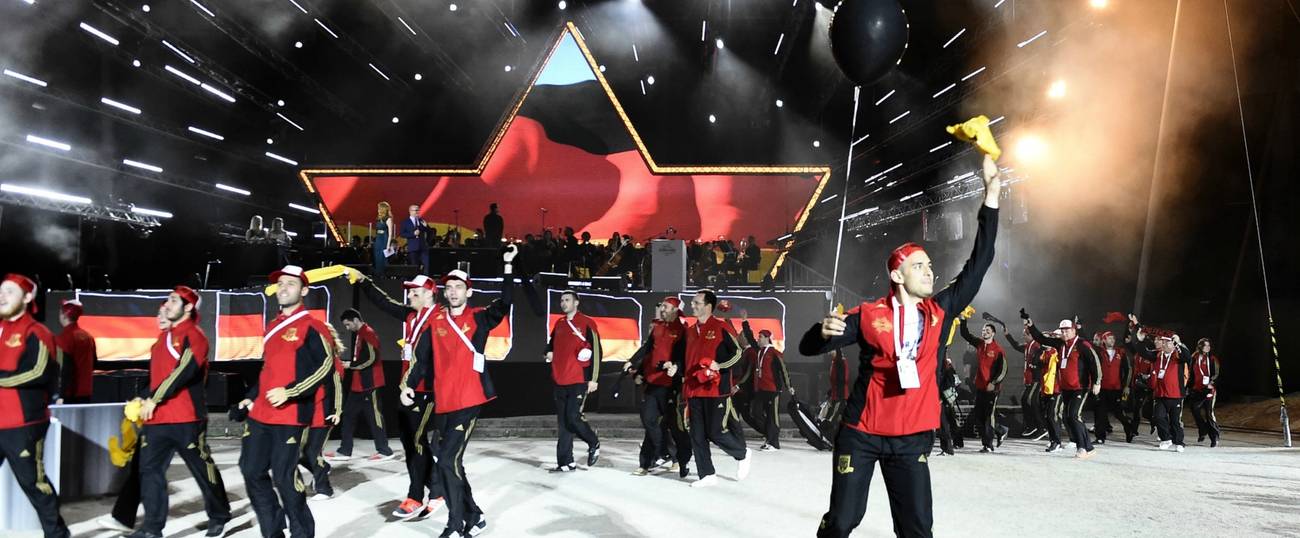In Berlin, a New Beginning
At the European Maccabi Games, an estimated 2,000 Jews convened at the site of the 1936 Olympics for a week of competition, remembrance, and moving on




With the recent rise in anti-Semitic demonstrations and violence, Jews are leaving Europe—particularly France, where over 500 such incidents were counted in just the few months following the Charlie Hebdo and Jewish market attacks. Yet Jewish immigration to Germany—of all places—is on the rise, with an estimated 40,000 new Jewish citizens, largely from Israel, in Berlin alone.
To a growing number of Jews, evidently, Germany appears welcoming. Part of the reason may be the numerous, highly visible efforts made by German organizations and artists to force the nation to own up to its past. Even if one wished to, it’s hard to get through a day’s errands in Berlin without being stopped short by a sign like the one near the tony KaDeWe department store that lists the names of concentration camps as though they were destinations served by the local subway line, or Stolpersteine, golden “stumbling blocks” that name Jews who once lived at that site. These installations, emerging from around corners or under one’s feet, render the post-Shoah injunction—“Never Forget”—unavoidable.
And while rural areas may, as elsewhere, remain more conservative than urban counterparts, other German cities, large and small, have followed Berlin’s lead. The capital’s pioneering Jewish Museum and Memorial to the Murdered Jews of Europe are vital and effective. Yet more affecting still are those reminders that mix the horrors of annihilation with life’s dictate that we forge ahead despite all we know of its ultimate fruitlessness and brutality.
In a groundbreaking historic gesture, the all-Jewish European Maccabi Games were held, from July 27 to August 5, in Berlin’s Olympiastadion, which was completed under Hitler’s direction for the 1936 Olympic games, the ones chillingly immortalized in Leni Riefenstahl’s film Olympia. Hitler had attempted to ban Jewish athletes from competing in those games. Over the week of competition, approximately 2,000 Jews—a few among them descendants of the original Olympic athletes—were back.
In a devastatingly blunt speech at the opening ceremony, German President Johannes Gauck joined other officials in detailing the nation’s wrongs—a show of collective humility at sharp odds with the Nazis’ monstrous faux-Roman arena. Even more striking to me, as an observer, were the ceremony’s naïf glitz (Oscars-style song-and-dance extravaganzas; a lovely but odd reprise of Man of La Mancha’s “The Impossible Dream”), gentle silliness (the Republic of Georgia’s lone, grey-haired competitor clownishly waving and taking bows), and occasional awkwardness (French athletes showing up for the official promenade late, straight from the airport, suitcases in tow).
Also notable was a lengthy tribute to fin-de-siècle German-Jewish critic and early Zionist figure Max Nordau. Nordau’s clarion call for a new race of Muskeljuden—Muscle Jews—countered proto-Nazi notions of the Jewish body as repulsively “decadent” and weak. While, indeed, Jews have been forced to struggle to disprove such stereotypes, Nordau—unbeknownst, it seemed, to the event’s producers—has been widely critiqued by scholars as reinforcing them.
Performances by German-Muslim hip-hop artist Adel Tawil, formerly-Hasidic American rapper Matisyahu, and transgender Israeli Eurovision star Dana International broadcasted crucial messages of tolerance, adding a further surreal atmosphere to the show. (Israel, though mentioned, was not a central focus of the ceremony, which was emceed by Russian-Jewish and Israeli entertainment figures in the German, English, and French languages. The absence of Hebrew, apart from a few religious references in the ceremony and at separate worship events, reinforced the sense that this was to be an international affair.)
The sporting matches themselves, between amateur groups of varying ability levels and ages, seemed—in stark contrast to the stadium’s fascist statuary, stone bodies carved in grotesque paean to ideals of Aryan perfection—marked rather more by spirit than by mere prowess. The goal was far less to win than simply to play: pale or dark, tall or small, muscled or soft, straight-featured or organically-formed, alive in rightful dignity and perfect human grace.
If dehumanized, dehumanizing Nazi doctrines operated through a banality of evil, in Hannah Arendt’s famed phrase, the Maccabi redress seems, finally, to lie in a converse banal-sublime of good. Here history-making—with all the gravity natural to the occasion—and history-breaking through humor and ease each hold an important place.
News, over the weekend, of Muslims taunting of a group of Maccabi guests, and insults shouted at the guards of the athletes’ hotel, briefly tempered the event’s festive air. But all remained safe. In Germany the games, and Jewish life, go on.
Shelley Salamensky is a scholar and writer. Her work has previously appeared in Tablet, as well as The Paris Review, The Wall Street Journal, and The New York Review of Books, and elsewhere.